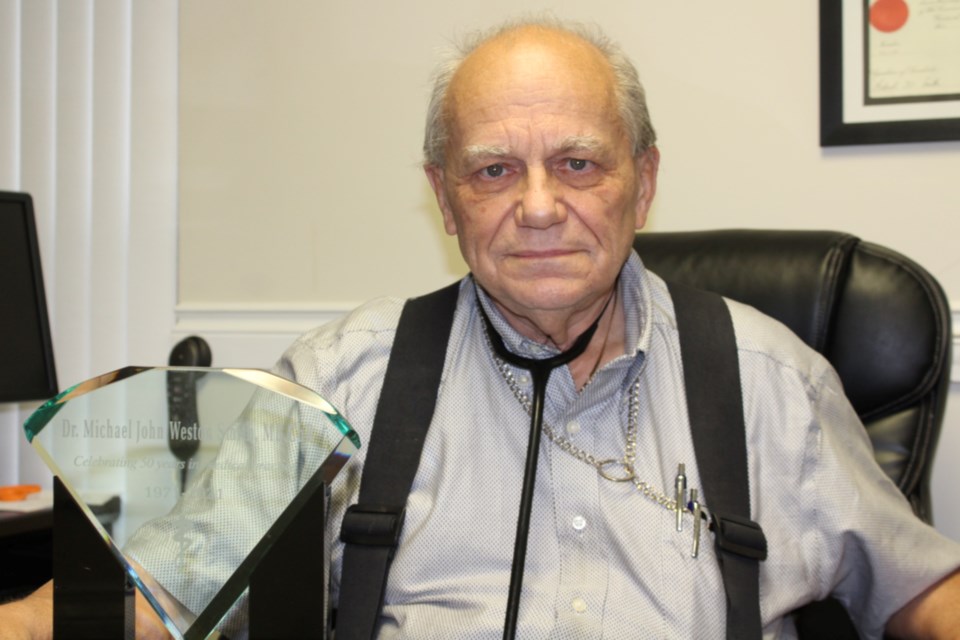ATHABASCA — It’s a long way from England and five decades since earning the title of doctor, but one man has made both those journeys.
Dr. Michael Weston Smith was named for his father who inspired, or rather, lightly prodded him into the medical field leading to studying at the University of Birmingham Medical School, his father’s alma mater.
“I got an interview with a bunch of universities including Birmingham Medical School, so I thought ‘What the hell,’” he said in a July 28 interview. “I didn't particularly want to be a doctor – I was thinking about marine biology – but I thought, ‘Well, why not get to be a doctor?’ Actually, the reason why is I thought it would be really cool to have doctor in front of my name.”
Smith’s father inspired two more of his siblings – four brothers and one sister – into the medical field as well
“I was the oldest; No. 2 got to be a doctor; No. 3 got to be a doctor; No. 4 turned to the dark side, (he) got to be a lawyer; No. 5 sold plastic laminate and the girl – she went to university and became a social worker,” said Smith.
His mother was also someone of importance, not just to him and his siblings but in a career of her own.
"She became a magistrate and in Britain magistrates do more than they do here; she actually sat on the bench,” he said. “There were three of them so, like tribunal magistrates and between them they can send people to prison for up to three months. She was really tough. They sent quite a few people to prison.”
It was also his mother who was the smartest person in the room he said.
“Apparently there was a group of 600 kids, and she was the top out of 600 kids; highest IQ, reading ability, maths and stuff.”
The United Kingdom has a different way for universities to select students to wander their hallowed halls called UCCA (Universities Central Council on Admissions) at the time, which is now UCAS (Universities and College Admissions Services). Students provide one application and the organization acts as clearing house to match them with potential post-secondary institutions.
“The universities went to UCCA, and kind of browsed around and invited (students) according to their status because some of them were desperate for anybody,” said Smith. “The medical schools were quite picky. So, I went to medical school; started there in 1966 and graduated in 1971.”
After graduating he had to do six months of surgery and a six-month internship in medicine followed by a six-month stint in obstetrics.
“The midwives were supposed to do all the normal deliveries, and I did the abnormal work so like forceps,’ he said. “I wish that I had done six months in anesthesia which is another thing you could do, and that would have been easy to get into as well. Then I would have had much more experience with care of the unconscious patient; I would have been able to be worked better in (emergency).”
Eventually he says he got “fed up” practicing medicine in Britain and he had a bug to wander with Canada always fascinating him.
"There were ads in the British Medical Journal so I finally wound up in Manitoba (in 1975), for about 18 months or more, I think just under two years,” said Smith. “I worked for an outfit called the Northern Medical Unit.”
The J.A. Hildes Northern Medical Unit started July 1, 1970 in Churchill, Manitoba and also services the Kivillaq Area of Nunavut with three hospitals and 12 nursing stations in Manitoba, and eight Nunavut health centres according to their website.
“Then I was thinking about coming either to British Columbia or Alberta, and I actually got offered a job in Grand Forks, B.C. but I also got offered a job in Alberta, and I chose that one,” he said. “So, I went to Grand Prairie (in 1977) for a couple years.”
In 1979 he moved to Boyle staying for 15 years before transferring to Athabasca. By then he and his first wife had divorced with her going back to England, never becoming accustomed to Canada he said. It was there he met his last and current wife Evelyn, the woman he describes as “the love of my life.”
"My wife wanted me to have a hospital job ... so, we came to Athabasca and I've been here ever since.”
Life has changed for Smith over the years, immigrating to Canada, seeing innumerable patients over five decades and watching medicine evolve. He doesn’t move quite as swiftly but his eyes are quick to light up with a good joke or memory. And for now, he has no plans to leave it all behind.
“I’m looking at the certificate, 17th of July, 1971. The black ink is already fading,” he said. “No, I don't have any plans to retire; when the Grim Reaper comes, I guess.”



